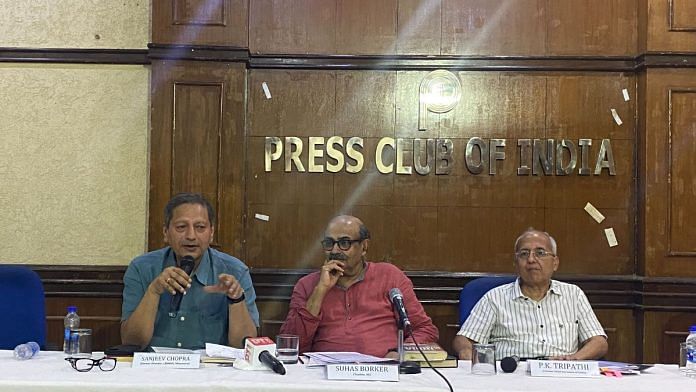From 2011 hit Singham to Netflix series Khakee, Bollywood has often used the tense relationship between politicians and IAS-IPS officers for its action-crime plots. The pressure exerted by the character-politician and the pushback from the fictional civil servant has perfectly relayed the complex navigation of power and politics in Indian society.
So, when PK Tripathi, a 1977-batch IAS officer of AGMUT Cadre, and Sanjeev Chopra, ex-director of LBSNAA, got together to speak about civil services and the Indian Constitution in Delhi, it was this tug-of-war between power and politics that emerged in their stories and the ‘lessons’ they learned during their tenure.
Very early in Tripathi’s career, a politician gave him a pro-tip. He told him that he would seek his help with hundreds of tasks, but the decision of what can or cannot be done would always rest with the officer. Tripathi said he even developed a secret code along the way.
Tripathi recalled an incident when a politician introduced someone to him as ‘my closest friend’, and told him to do some work for him. “But the next moment, he turned around and asked the name of his closest friend—‘Kaka, tera naam kya hai’ (brother, what is your name?). So, it was his signal. As soon as he asked the name, I understood,” said Tripathi.
Also read: Steel frame of India is singing and dancing. IAS officers are discovering their art
Behind the scenes
The 11th edition of the conversation — Civil Services and the Indian Constitution — was hosted by the India International Centre (IIC) and the Press Club of India, and saw the participation of several journalists, attorneys, and activists.
Tripathi, who was Secretary of New Delhi Municipal Council (NDMC) and Commissioner (Land) of Delhi Development Authority (DDA), had other anecdotes to share.
Talking about Delhi’s former chief minister Sheila Dikshit, Tripathi said that she once asked him to write a recommendation letter for someone but he didn’t do it.
“She did not ask me to do it but she said that as of now no one from my office is allowed to write a recommendation except you,” he added. Tripathi overruled Dikshit’s recommendation and she never questioned it, he claimed.
The panellists also discussed the popular question asked from bureaucrats—do they prefer to work with the state governments or the governors?
“Politicians come in all shapes and sizes. Maybe a majority of the politicians are difficult to work with, but the worst period I had was not with any politician but the lieutenant governor, who was also a civil servant. It was such a relief when he got transferred somewhere else,” said Tripathi.
Chandni Mehra, a Delhi High Court lawyer said she enjoyed it when Tripathi spoke about the lieutenant governor who intruded in the affairs of the administration many times.
“It was nice to know the scene from the other side,” she added.
Meanwhile, Sanjeev Chopra’s experience was a little different from Tripathi’s.
“Working with the current CM of West Bengal was more difficult than [when] we were dealing with the CM of the CPM,” Chopra recalled. “There’s a major difference between all-India political parties, which have a central authority, to whom redressal can be made, whether CPM, Congress or BJP. There are checks and balances. And then you have parties that are totally CM-driven or totally on their own.”
Also read: IAS officer’s Northeast book launch unites Lutyens’ Delhi. They bond over butter chicken
IAS officer’s Bharat Ratna
At the event, a fascinating story from MN Buch’s book, An India Reimagined: Governance and Administration in the World’s Largest Democracy, served as a reminder of the enduring perks of being an IAS officer.
Suhas Broker, the moderator, remembered that one day, when Buch came out of the IIC library to walk back home, he found it was raining. An autorickshaw driver, a Sikh, was waiting at the gate and agreed to take him home. The driver did not ask for the destination, but still drove him straight to his home at 18, Teen Murti Lane. He then refused to accept any money from him.
Buch insisted.
Broker then read out the passage from the book that detailed the driver’s response to the IAS officer: “You do not remember me but I had come to see you in DDA. I had registered for a house which I should have been allotted years ago. But despite wearing out several pairs of shoes, I got no solution. One day, I came to Vikas Minar and entered your office. You asked me my problem. I, a mere autorickshaw driver, was not only heard but the housing commissioner was sent for and, two hours later, I walked out with my allotment order and occupation order. I can never forget my debt of gratitude to you and will never take any money from you.”
“That was like Bharat Ratna to me,” was how Buch described it.
(Edited by Ratan Priya)



